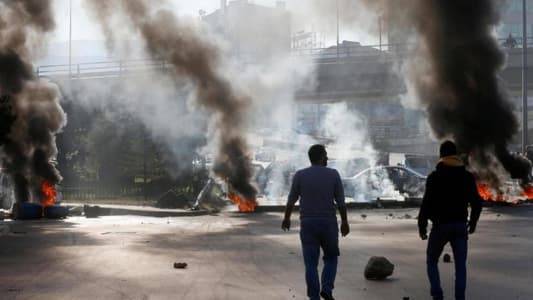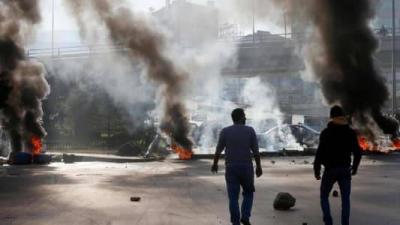The rapid surge in the price of the dollar, which increased by more than 6,000 Lebanese pounds in just two days amidst the intense political and judicial conflict, poses dire consequences that should not be taken lightly. The situation has begun to spiral out of control in "everybody's fight." Aside from the rampant increase in prices of goods in supermarkets, fuel prices have crossed the one million Lebanese pound mark, with the price of a gasoline canister reaching one million and five thousand pounds for the first time in Lebanon's history, rising by 306,000 pounds in just 22 days. This has prompted taxi drivers to raise their fares to 70,000 pounds per passenger.
In the face of this crisis, which has driven citizens to take to the streets to raise a cry that might shake the accountability of officials, warnings have multiplied about the lack of food, healthcare, and educational security... should the collapse of the lira continue at this rate towards a significant downturn.
In this context, former minister and head of the economic bodies, Mohammad Chaker, stated in an interview with "Nidaa al-Watan" that "the situation is serious, and there is fear of the country sliding into the unknown, given the alarming deterioration in all aspects of life driven by the rapid collapse of the lira against the dollar during the presidential vacuum and political paralysis." Chaker expressed surprise at the rapid deterioration of the dollar exchange rate that began about three days ago, particularly after the end of 2022, which had been marked by optimism for the economic sectors. The latter saw good numbers that were not expected after the summer, Christmas, and New Year holidays. Even restaurants have reopened their doors, with 30 new restaurants creating 450 job opportunities.
However, since three days ago, the situation has "collapsed," experiencing dramatic and unforeseen downturns, which he believes has resulted from external interventions and internal parties with interests in manipulating the situation for their own purposes, especially since the affairs had not previously appeared to be at such a fragile level.
Expressing concern about a potential social explosion that "would destroy everything," he urged for radical solutions before it is too late, emphasizing that "the only solution to curb the ongoing deterioration is the normalization of the political situation, which hinges on the election of a president." He believes this step alone could reduce the dollar exchange rate from 56,000 pounds to below 40,000 pounds, as it would instill hope for the country’s entry into new horizons. This would be especially true if it were followed by the formation of a government, the approval of stalled reform laws, and the signing of an agreement with the International Monetary Fund.
He warned that "we are facing tougher days in terms of our food security than those we are currently witnessing if we do not have sufficient internal awareness to elect a president. People, for the time being, are still meeting their needs for food and drink, but if the decline continues its rapid trajectory, greater challenges lie ahead."




